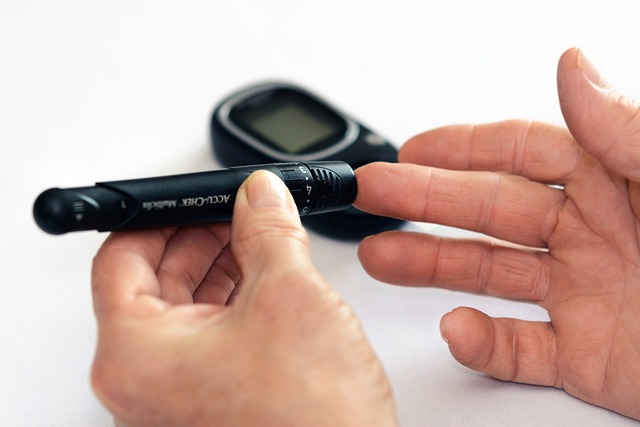Vitamin deficiencies, often overlooked but significant, can be identified via simple blood tests. These tests are powerful tools for proactive health management, revealing personalized nutrient levels and subtle symptoms like fatigue and weakness. Key vitamins to check include B12, D, C, and K, as deficiencies lead to various issues. Accurately interpret test results and address deficiencies through dietary changes or supplementation, with regular follow-ups to ensure effective management. Blood tests for vitamin deficiency are essential for optimizing nutrient levels and overall well-being.
Are you aware that subtle signs like fatigue or brittle nails could indicate a vitamin deficiency? Private blood tests offer a convenient and effective way to identify these hidden nutritional gaps. This comprehensive guide explores the significance of these tests, focusing on common causes and symptoms of vitamin deficiencies. We’ll delve into key vitamins to test, their functions, and interpreting results for informed next steps towards optimal health.
- Understanding Vitamin Deficiencies: Common Causes and Symptoms
- The Role of Private Blood Tests in Diagnosis
- Key Vitamins to Test for and Their Functions
- Interpreting Results and Next Steps After a Vitamin Deficiency Diagnosis
Understanding Vitamin Deficiencies: Common Causes and Symptoms
Vitamin deficiencies are common health issues that can arise due to various factors, and identifying them early is crucial for maintaining optimal well-being. A blood test for vitamin deficiency is a straightforward method to assess your nutrient levels and overall health. These deficiencies often go unnoticed, as symptoms can be subtle or even absent in the initial stages. However, over time, they can lead to more severe health complications if left unaddressed.
Common causes of vitamin deficiencies include poor diet, certain medical conditions, age-related changes, and increased nutrient requirements during specific life stages. For instance, a diet lacking in essential vitamins and minerals may result in deficiencies. Additionally, conditions like malabsorption disorders or chronic illnesses can impair the body’s ability to absorb and utilize vitamins effectively. Understanding these causes is essential when recognizing symptoms such as fatigue, weakness, poor concentration, and changes in skin or nail health, which may indicate underlying vitamin deficiencies.
The Role of Private Blood Tests in Diagnosis
Private blood tests play a pivotal role in identifying vitamin deficiencies, offering individuals a powerful tool for proactive health management. These tests provide detailed insights into the levels of various vitamins and minerals in the bloodstream, allowing for accurate diagnoses that conventional checks might miss. With the ability to pinpoint specific deficiencies, individuals can tailor their dietary choices, lifestyle adjustments, or supplement regimens accordingly.
Unlike general health screenings, private blood tests for vitamin deficiency offer a personalized approach, considering unique biological profiles. This is particularly beneficial for those experiencing subtle symptoms or for whom standard medical assessments fail to reveal underlying issues. By accessing this data, people can take charge of their well-being and make informed decisions to optimize nutrient levels and overall health.
Key Vitamins to Test for and Their Functions
When considering a blood test for vitamin deficiency, there are several key vitamins that are essential to check due to their vital roles in overall health. Vitamin B12, for instance, plays a crucial part in nerve function and the formation of red blood cells. A deficiency can lead to anemia and neurological issues. Similarly, Vitamin D is integral for bone health as it aids in calcium absorption, making it critical for preventing conditions like rickets and osteoporosis.
Another important vitamin to test is Vitamin C, which acts as a powerful antioxidant, supporting immune function and collagen production. This vitamin is essential for wound healing and maintaining healthy skin, teeth, and gums. Additionally, checking for Vitamin K is crucial, as it plays a key role in blood clotting and bone metabolism. Deficiencies can increase the risk of bleeding disorders and bone fragility.
Interpreting Results and Next Steps After a Vitamin Deficiency Diagnosis
After receiving your blood test results, it’s crucial to interpret them accurately to understand your vitamin deficiency. Your healthcare provider will examine the levels of various vitamins and minerals in your blood, comparing them against established normal ranges. If a deficiency is detected, they will communicate the specific vitamin or vitamins affected. For instance, low levels of Vitamin D, B12, or iron might indicate respective deficiencies.
Once a vitamin deficiency is diagnosed, the next steps involve addressing the deficiency through appropriate means. This could include dietary changes, such as incorporating more nutrient-rich foods into your diet. Supplementation is also a common approach, where your doctor may prescribe specific vitamins or minerals to raise your levels back to normal. Regular follow-up blood tests are essential to monitor progress and ensure that the deficiency is being effectively managed.
Private blood tests play a pivotal role in identifying vitamin deficiencies, offering individuals a proactive approach to their health. By understanding common causes and symptoms, testing key vitamins like B12, D, and iron, and interpreting results accurately, one can take informed steps towards correction. This personalized method empowers folks to navigate potential nutrient gaps, enhancing overall well-being. For those seeking to optimize their health, a simple blood test can be the first step towards a brighter, more vibrant future.
